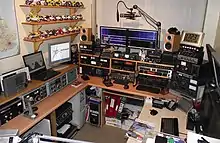Radio shack
A radio shack is a room or structure used for housing radio equipment.[1]

History
During radio's early days, equipment was experimental and often home-built. The first radio transmitters used a loud spark gap to generate radio waves, and so were often housed in a separate outbuilding or shed. When radio was first adopted by the U.S. Navy, a small, wooden structure placed on deck to house the ship's radio equipment became known as the "radio shack".[2] Today, a radio shack can be anywhere that radio equipment is housed and operated, usually a room such as with amateur radio stations, but for some the entire "shack" may consist of a hand-held radio or two while others may operate mobile equipment in a vehicle.[3] In amateur radio use, the room housing the equipment is often called a "ham shack".[4]
See also
References
- Random House Unabridged Dictionary: radio shack Random House, Inc.
- Rankabull Archived 2015-10-13 at the Wayback Machine The name "RadioShack" is a nautical term that dates back to the invention of the radio at the turn of the 20th century. At the time, wireless radio equipment aboard ships was generally housed above the bridge in a wooden structure called the "radio shack." The founders of RadioShack thought the name appropriate for a new retail business that supplied electronic equipment to "ham" radio operators and ships' radio officers.
- H. Ward Silver Ham Radio For Dummies Wiley Publishing, 2004, ISBN 978-0-7645-5987-7 Where did the phrase, radio shack, come from? Back in the early days of radio, the equipment was highly experimental and all home-built, requiring a nearby workshop. In addition, the first transmitters used a noisy spark to generate radio waves....many early stations were built in a garage or tool shed. The term “shack” was only natural and carries through today as a description of the state of order and cleanliness found in many a ham’s lair
- "Ham Radio Glossary".